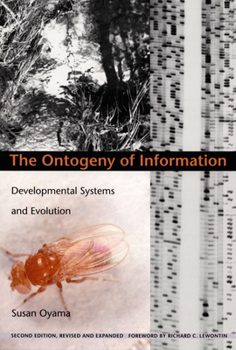The Ontogeny of Information: Developmental Systems and Evolution
(Part of the Science and Cultural Theory Series)
Select Format
Select Condition 
Book Overview
The Ontogeny of Information is a critical intervention into the ongoing and perpetually troubling nature-nurture debates surrounding human development. Originally published in 1985, this was a foundational text in what is now the substantial field of developmental systems theory. In this revised edition Susan Oyama argues compellingly that nature and nurture are not alternative influences on human development but, rather, developmental products and the developmental processes that produce them.
Information, says Oyama, is thought to reside in molecules, cells, tissues, and the environment. When something wondrous occurs in the world, we tend to question whether the information guiding the transformation was pre-encoded in the organism or installed through experience or instruction. Oyama looks beyond this either-or question to focus on the history of such developments. She shows that what developmental "information" does depends on what is already in place and what alternatives are available. She terms this process "constructive interactionism," whereby each combination of genes and environmental influences simultaneously interacts to produce a unique result. Ontogeny, then, is the result of dynamic and complex interactions in multileveled developmental systems.
The Ontogeny of Information challenges specialists in the fields of developmental biology, philosophy of biology, psychology, and sociology, and even nonspecialists, to reexamine the existing nature-nurture dichotomy as it relates to the history and formation of organisms.
Information, says Oyama, is thought to reside in molecules, cells, tissues, and the environment. When something wondrous occurs in the world, we tend to question whether the information guiding the transformation was pre-encoded in the organism or installed through experience or instruction. Oyama looks beyond this either-or question to focus on the history of such developments. She shows that what developmental "information" does depends on what is already in place and what alternatives are available. She terms this process "constructive interactionism," whereby each combination of genes and environmental influences simultaneously interacts to produce a unique result. Ontogeny, then, is the result of dynamic and complex interactions in multileveled developmental systems.
The Ontogeny of Information challenges specialists in the fields of developmental biology, philosophy of biology, psychology, and sociology, and even nonspecialists, to reexamine the existing nature-nurture dichotomy as it relates to the history and formation of organisms.
Format:Paperback
Language:English
ISBN:0822324660
ISBN13:9780822324669
Release Date:March 2000
Publisher:Duke University Press
Length:296 Pages
Weight:1.14 lbs.
Dimensions:0.4" x 5.9" x 9.0"
Customer Reviews
1 rating
Great Book
Published by Thriftbooks.com User , 23 years ago
Sorry that my review is so small. This is a great book about the dichotomy of genes and environment and how there is no real line dividing the 2. It speaks of some of the misconceptions that way of thinking produces. It also discusses some of the common metaphors that have been used in the past relating genes to "blue prints" and the such and how these metaphors should be gotton rid of. The ingredients that go into an oransism and inheritance are many which includes genes, atmosphere, culture, and many more that she discuses. All are important in the construction of an organism and none are more important then any other. She also discuses the silliness of the nature nurture debate. I think this book and way of thinking is very important for science, social sciences and just the everyday [mis]conceptions most people in the western world have of the dualism of genetics and environment.





